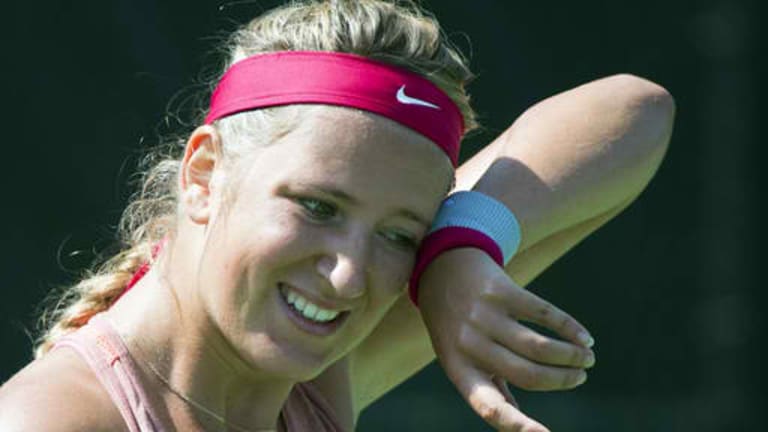Eugenie Bouchard tossed her racquet down, sat in her chair, and waited as her coach, Nick Saviano, rushed onto the court to talk to her. When he got there, she buried her face in a towel.
“I know, it’s overwhelming,” Saviano said.
It certainly wasn’t going as planned. This was Bouchard’s post-Wimbledon homecoming in her native Montreal, and the stadium was packed from the warm-up on. But they had hardly made a noise through the first five games. That's because Bouchard had lost them all to Shelby Rogers, a qualifier from the U.S. who was playing considerably better than her (current) ranking of No. 113. I had joked in my preview of this match that I hoped Bouchard would do a little better than she did in her last match, her blowout loss to Petra Kvitova in the Wimbledon final. She did, but not by much.
“I think I was feeling the pressure a little bit on the court,” Bouchard said after her eventual, strangely topsy-turvy 6-0, 2-6, 6-0 loss to Rogers. “I felt a little match rusty, kind of. But I knew coming into the match that I can’t use those excuses. I knew it would be kind of a difficult match.”
From her serve to her strokes to her swing volley, Bouchard was out of rhythm. Where she has looked composed for much of 2014, she looked rushed yesterday. But I thought that was largely due to the play of Rogers. The 5’9” South Carolina native has more natural power than Bouchard; with her Western grip, she can smack a forehand winner while standing behind the baseline, and her two-handed backhand was effective on returns. Like Kvitova at Wimbledon, Rogers kept putting Bouchard’s serves back at her feet and forcing her to hurry in rallies.
“This was my first experience in an atmosphere like this,” Rogers said. “The whole stadium cheering for one person. I was just trying to stay in my little zone, zone it out....In the third set, I just took it one point at a time and stuck to my routines.”
Rogers’ win, and especially its two bagels, was an upset, surely. But it didn’t come out of nowhere. Earlier this summer at a clay event in Bad Gastein, Rogers beat Sara Errani and Carla Suarez Navarro on her way to her first WTA final. Last week in D.C., the 21-year-old upset Alizé Cornet.
“She was solid the whole match,” Bouchard said of Rogers, who recently left the USTA training center in Florida to work with a private coach. “She never really sprayed too many balls, and she was always there. Whenever I let up a little bit, which I think I did in the third, she was all over it. She definitely took the match.”
Bouchard, always level-headed, said she was happy that she had at least won the second set—in other words, she was happy not to have been double-bageled. Feeling the pressure of the moment was understandable; as Rogers said, it’s rare to hear an audience go completely silent when one player isn’t winning points. The scene in Montreal reminded me of watching, and hearing, a Spanish player lose in Madrid.
This was a unique situation, but is it a reason to worry for Bouchard? She’ll obviously play better, but like Kvitova, Rogers has something that the Canadian lacks—the raw timing that can create winners from anywhere. That’s a trait that virtually all of the women who have won Grand Slams in the last decade share, and which the women who haven’t won Slams, like Aga Radwanska, don’t share. In some ways, this helps Bouchard; she has to construct and think her way through rallies. But when she’s off, she can’t count on hitting her way out of trouble.
